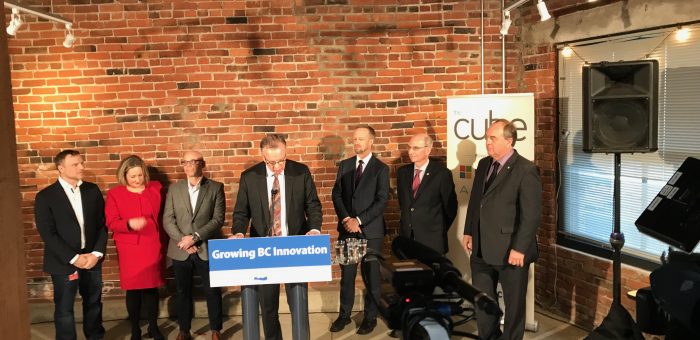Exploring government support for BC Tech and their Cube & Hub innovation centres in Vancouver
Today in Question Period I rose to ask the Minister of Jobs, Trade and Technology whether he was aware of the critical services and programs provided by BC Tech at the Cube and the Hub in Vancouver and the positive impact they have on our innovation community.
Below I reproduce the text and video of our exchange.
Video of Exchange
Question
A. Weaver: Hon. Speaker, I must say it is a kinder and gentler question period in the Legislature here today.
On that note, I will note that on February 5, 2018, the Minister of Jobs, Trade and Technology announced the appointment of B.C.’s first innovation commissioner. The announcement was at B.C. Tech’s Cube. This was widely celebrated as a significant step forward for innovation in our province. I was present at the announcement.
Just two weeks ago, at the B.C. Tech luncheon, the minister and I met some B.C. leaders in the tech sector. Companies that have grown and thrived thanks to the programs and services provided by the B.C. Tech Association.
My question is to the Minister of Jobs, Trade and Technology. Is the minister aware of the critical services and programs provided by B.C. Tech at the cube and the hub in Vancouver and the positive impact they have on our innovation community?
Answer
Hon. B. Ralston: I thank the member for the question. I too share his optimism about the growth of the technology sector here in British Columbia. Certainly the augmented and virtual reality sector, which the cube is a start-up laboratory for, is a very strong one. It’s a very strong sector — in fact, globally leading.
Since we have the ambassador for Korea here, on a recent trip with the Minister of State for Trade to Korea, we met with companies that are well aware of the opportunities here in British Columbia. In fact, there are exchanges, business exchanges, between the Giyungi Content Organization in the sister province to British Columbia and the sector here.
The B.C. Tech Association has provided leadership in that sector, I’m well aware of the opportunities that the cube has provided. Indeed, our government, in December, provided the sum of $500,000 to assist them in preparing as they move to a new funding model.
The initial funding for the cube came largely from the federal government, from the western diversification fund. They underwent a review of their funding of these incubators and have decided that they are heading in a different direction. So as the organization works out its approach, we have provided that money to assist the transition.
Supplementary Question
A. Weaver: Thank you for that very, very comprehensive answer.
The programs and services provided by B.C. Tech help people to take their ideas and turn them into companies. They help existing companies bridge what’s commonly known as the “valley of death.” That is, they help them manage the hyper-growth that these companies often encounter.
Programs and services are an essential engine for innovative growth in our economy, and they rely upon government and industry funding to be able to continue. But in the absence of provincial funding, these programs could be at risk.
Once again, my question is for the Minister of Jobs, Trade and Technology. Supporting innovation in our economy is a critical priority for the B.C. Green caucus.
Is the minister equally committed to ensuring the programs and services provided by the B.C. Tech Association at The Cube and the Hub are able to continue?
Interjections.
Answer
Hon. B. Ralston: I wish the answer were that simple.
The member has referenced the appointment of the innovation commissioner. In a recent report to the Legislature, he set out what he thought were important directions for government policy in the future. He recommends an economic and technology strategy that supports increased business investment in research and development, developing talents at post-secondary institutions and scaling up small businesses with huge growth potential. He’s suggested three different kinds of clusters, whether they’re regional community clusters, emerging technology clusters or scale-up, market-driven clusters.
Certainly, the B.C. Technology Industry Association is a strong leader in providing policy advice to the government. I think they have adopted and would recommend very similar solutions to those that the innovation commissioner put forward, particularly in relation to scaling up companies, taking companies from the start-up environment and building big companies here that are global leaders. And there are lots of opportunities to do that, given the strength of our sector here.
I thank the member for giving me the opportunity to talk about those policies, and I look forward to developing those policies with all members of the Legislature in the future.





2 Comments
We are a health science accelerator focused on scaling and supporting early stage BC tech companies and others across Canada. Unfortunately there is a significant need but very little financial support in BC. And interestingly enough, when we attempted to book a meeting with your office to make you aware of what we do for BC companies, we were told ” Unfortunately, due to his busy schedule he will be unable to meet and sends his regrets”. Not so sure therefore that supporting innovation in our economy is a critical priority for the B.C. Green caucus either.
We get hundreds of requests for meetings and there are only three of us in the legislature. As there are only 24 hours in a day, the BC Green Caucus and staff meet with as many stakeholders as possible. But we have to decline many meetings as well. I am sorry that we didn’t have the time to meet, but those are the realities we face with just three MLAs holding the balance of power in a minority government. We prioritize our riding issues and broader policy related meetings.